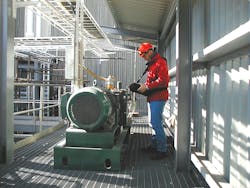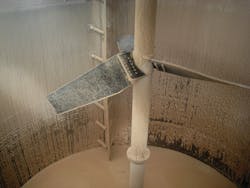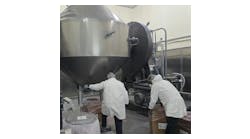Why you shouldn’t add unknowns into the mix
Mixing is a vital part of many processes. How a mixer performs can affect final product quality, productivity, process times and energy efficiency. There are many factors in the design of a mixing solution that will affect how well it operates. Understanding how to optimize these factors can make a real difference to plant efficiency and profitability. As a result, a great deal of time is usually spent in ensuring the right mixer is selected for an application, often following a series of tests of different models and configurations. Expert mixer suppliers also often use Computational Fluid Dynamics (CFD) to predict process performance and to carefully evaluate a mixer design for a given application.
Mixing is inherently a mechanical process, and one that can often be tough on the machinery used. Regular maintenance and replacement of worn or damaged parts are an integral step in keeping operations running smoothly. Having spent so much time carefully designing, verifying and engineering a mixing solution, why then would you use cheaper, non-proven parts to replace the original ones?
Unfortunately, however, plant managers often fall foul of the quick savings to be made by using a non-OEM part for a repair. Although, on paper, a part may appear to be the same, quite often some characteristics are lost from the original, meticulously engineered component. This can lead to premature failures, more extensive damage and extended periods of downtime to resolve the issue — all of which are very costly to the business. Examples where this happens are all too common.
A mining company found some 37kW Lightnin agitators with A510 impellers were overloading and contacted SPX FLOW to enquire about increasing the size of the installed motors to resolve the issue. On review of the design of the installation, however, it was found that the drive was already at maximum design power and should have had more than adequate capacity for the process. After further investigation and discussion, it was established that the site had been using locally fabricated blades as replacement parts rather than purchasing the original ones. Although these non-OEM blades appeared to be like-for-like with the original part, slight differences in their design meant they were drawing more power than necessary. There had also been some change in process conditions from the original design specification, which had further contributed to the overloading.
To get this customer back on track, SPX FLOW designed a new mixer wet end for the installation with original A510 impellers and a pipe shaft instead of a solid shaft. The resulting performance of the mixer created significant improvements in the process results. The improved design was rolled out to other tanks on-site, and the customer’s engineering team specified only original A510 blades should be purchased in the future.
Another example relates to a mixer used in a paper stock mixing application. When an impeller that had worked reliably for years finally failed, the customer opted to buy an alternative, non-OEM part. Unfortunately, this part was not as robust and broke in less than a month. The tank containing the mixer had to be reopened to carry out repairs, and the savings made with the cheaper part were quickly overtaken by lost production time.
Great mixers require precision
Mixers and agitators are manufactured to exceptionally tight tolerances because of the forces they are subjected to in the mixing tank. Any seemingly minor changes can have huge impact on the forces and loads within the system. Shaft components, for example, can be subjected to an additional 220 in-lbs. of bending for every 0.001 inch of runout over the length of a 10-foot shaft. Such unforeseen loading leads to increased deflection and bearing reactions, and can considerably reduce the life of the agitator.
Equally, any changes to bearing spacing, shaft diameter or overhung mass can change the critical speed of the mixer. This can lead to operators unknowingly running equipment in danger zones that could lead to massive vibration and catastrophic failures.
The exact impeller formation is also critical to process performance. Any differences in the blade tip chord or twist angle across the impeller blades will have detrimental impact. For OEMs, this is overcome using forming dies and rigorous inspection processes to precisely control the fabrication of impeller components.
It’s not just about the part
As can be seen from the examples above, even parts that appear to be like-for-like replacements may not perform as well as the original parts. When turning away from the original equipment manufacturer for help over the life of a mixer, however, it is not just a failing part that may cost a plant money. Companies such as SPX FLOW can sometimes introduce improvements to a mixer’s performance based on ongoing process results or changes that have occurred in the process over time. With expertise in areas such as chemical engineering, fluid dynamics and process engineering, on top of continued research and development into mixing technology and its application, such companies are best positioned to advise and adapt existing installations to improve mixing performance, efficiency and process results. Although a local fabricator may be able to produce a similar part, it is not likely to be able to offer this extended service and assistance in optimizing processes throughout their lifetime.
Summary
The ultimate question that needs to be asked when looking at cheaper, alternative parts for a mixing process is: “Is it worth the risk?” The potential for losses far outweighs the small gains to be made from the saving in cost of a blade or shaft. OEM parts are manufactured to the same exacting standards as the original mixer.
Richard Kehn is Director of Engineering and R&D at SPX FLOW (Lightnin and Plenty Mixers). Richard holds a B.S. in Chemical Engineering from Rensselaer Polytechnic Institute and an M.E. in Mechanical Engineering (with a concentration in computational fluid dynamics (CFD)) from Rochester Institute of Technology. Evan Burley is a Field Service Engineer for SXP FLOW. Based in Charlotte, North Carolina, SPX FLOW innovates with customers to help feed and enhance the world by designing, delivering and servicing high-value solutions at the heart of growing and sustaining our diverse communities. The company's product offering is concentrated in rotating, actuating and hydraulic technologies, as well as turn-key systems, into the food and beverage, industrial and power and energy end markets.



